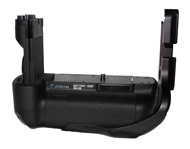 The battery grip is a great accessory for an SLR: not only does it allow you to plug in two batteries to your camera, but it also helps give you a much better grip on the camera, making it easier to handle.
The battery grip is a great accessory for an SLR: not only does it allow you to plug in two batteries to your camera, but it also helps give you a much better grip on the camera, making it easier to handle.
But, there’s at least one situation where you should avoid using this great accessory: whenever you’re shooting handheld.
Yeah, yeah.. I know, “always use a tripod.” But, there are times when it’s just not possible to use a tripod, like when you’re trying to photograph birds in flight. In these situations, you’ll likely be changing camera positions pretty quickly.
This might not make sense at first: isn’t the battery grip supposed to help you hold the camera? Well, it certainly does that, but it also adds a significant amount of weight to your camera, which makes it harder to hold still when it’s off a tripod. I never really noticed how much of a difference it makes until I went out photographing hawks in flight with my dad.
My dad doesn’t use battery grips on his cameras, and I never took mine off before, so when I picked up his Canon 50D with a 400mm lens on it, I almost felt like I was holding a feather in comparison to my Canon 5D with a battery grip and metal L-plate attached.
The bottom line with handholding a camera is that the less weight you have in your hands, the more stable you’ll be able to hold that camera (especially if you’re holding it for any length of time). And, as you know, getting sharp photos isn’t just about a still subject, but equally important is a still camera 🙂
If you enjoyed this article, and would like to read more, please signup for free updates by email or RSS.
 About the Author: Steve Berardi is a naturalist, photographer, computer scientist, and founder of PhotoNaturalist. You can usually find him hiking in the beautiful mountains and deserts of Southern California.
About the Author: Steve Berardi is a naturalist, photographer, computer scientist, and founder of PhotoNaturalist. You can usually find him hiking in the beautiful mountains and deserts of Southern California.
My experience has been the opposite. Whenever I’ve used heavier equipment, it’s felt more solid and easier to hold in a solid position. I’m not saying easier on my arms…. but easier to keep steady. A heavier camera means more inertia. It takes more force to make it move, so you don’t have to be as steady. Though if you are adding weight by adding a longer lens, that complicates things because smaller movements are exaggerated.
I agree with Erik: more weight means more inertia so it’s harder for the camera to move – either by your decision or accidentally, so blurring is reduced. Lenses of course can balance or unbalance your camera, especially a fast and long lens which you may have chosen for capturing birds, so your camera, despite the additional weight of the grip, may tilt forward because of the heavy front lens.
I think a heavy camera can help reduce blurring either with shorter and longer exposures and any kinds of lenses. At least, as a physicist, I don’t see any particular effect to consider that could make it otherwise, and my experiences as a photographer support my theory.
I am going to chime in with others and say that my experience also has been just the opposite.
I’m going to side with Erik, Benbe, and eman. My experience has been that cameras with battery grips feel more stable when shooting hand held with a long lens such as the 400 f/5.6 plus having that extra shutter release is SO nice when you rotate the camera from horizontal to portrait mode. I will agree with you regarding the extra heft of a 5D with grip, two batteries, and L-Bracket though and wouldn’t care to use that combination with the nifty fifty or some other lightweight lens. You can always lighten the load a little by removing the L-Bracket and one battery.
Well I do agree with that the extra weight can wear you down during a long day of shooting but I don’t have one of those monster lenses that you use. After training myself to stay steady with the grip I would be hard pressed to go back and have my elbow flopping around in the air again. I appreciate the suggestion but I think your readers and followers should think twice about removing the battery grid just because of weight, you are also asking us to abandon the technique we use to photograph with as well.
@Erik / Benbe / eman / Zack – I understand that with the principle of inertia, that an object with a greater mass requires a greater force to be moved. But, I also know that when you’re holding a heavier object, your muscles will get tired more quickly. And, when your muscles get tired, it becomes a lot harder to keep that object still.
So, I guess I should have said to avoid the battery grip when you’re holding your camera and lens for an extended length of time. If you’re just taking a few shots here and there, yeah, keeping the battery grip on probably makes more sense. But, if you’re going out for the whole day to photograph hawks that are flying above you, I think your arms will get tired pretty quick (at least mine do, heh).. having a little less weight on the camera will help slow that tiredness down 🙂
@Matt – I would hope that everyone thinks twice before they listen to someone 🙂 I do think that removing the battery grip can help in some situations though (when you need to handhold a camera with a long lens for an extended amount of time).
It’s an interesting idea Steve. I love my battery grip for all the reasons you and the others have mentioned, but there are a couple times when I do like to take it off and photograph without it.
One of those times is when I’m going hiking and want to keep things as light as possible. One hike I went on I removed the battery grip and threw on a cheap 28-105mm kit lens and hit the trail. The combination made for a very light weight kit for a nice long hike. I have taken it off on several other hiking occasions for the same reason, less weight in my pack.
Another time I take the grip off of my camera is when I’m setting up on a tripod and triggering the camera remotely. When I’m doing this, I’m generally using one of those cheap $30 tripods from a department store and the extra weight on top can make things pretty unstable.
For most of my serious shooting, I’m leaving the grip on, but there are times when I’m willing to sacrifice the extra power and versatility in order to lighten my load.
I’m about to buy one. Mainly for the reason that it makes my camera look bigger aka I look cooler.
Add another vote to “opposite” side. I guess I’ve been shooting for so long, I’m used to the heaviness. I do have a small point and shoot I use for personal projects, but I admit they’re difficult to hold still and get a clear shot with nothing to weigh it down for me.
To add to Steve’s reasoning, I’d like to mention that not using a battery grip for birds in flight isn’t only a balance issue but also an issue of speed and efficiency. When I’m photographing a raptor in flight I usually have less than a second to get off as many shots as possible. Turning the camera with my finger on the trigger at all times is far faster than turning the camera and moving my finger to the alternate trigger button on the battery grip. It also allows me to quickly shoot the raptor at angles in between 0 and 90 degrees. It may not sound like much time will elapse but for me personally it makes all the difference in whether I get a good shot or not.
I personally prefer shooting without the grip for the same reason that Steve gave here. It tires the muscles. It might not be as “stable” as one with a grip, but when you shoot a lot you get used to it and eventually you can take more steady shots.
Weak arm sir… weak arm…..